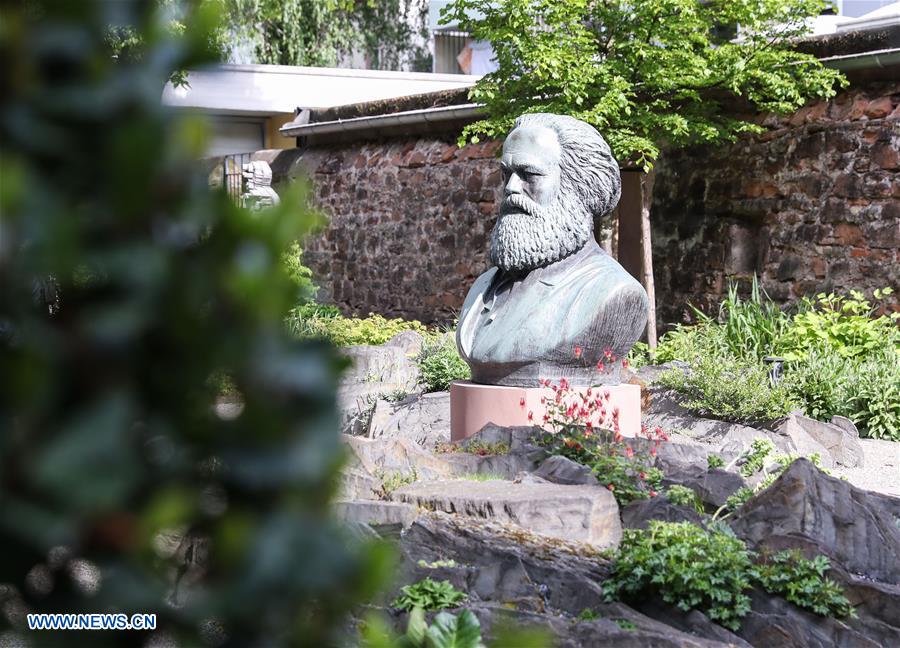
Photo taken on May 3, 2018 shows a head sculpture of Karl Marx at the backyard of Karl Marx House in Trier, Germany. Karl Marx House, where Karl Marx was born, will be reopened to public on May 5 with new permanent exhibition, after a remodeling since Sept. 16, 2017. (Xinhua/Shan Yuqi)
by Xinhua writers Zhai Wei, Zheng Jianghua
BRUSSELS, May 5 (Xinhua) -- On the 200th anniversary of Karl Marx's birth and 170 years since the publication of the Communist Manifesto, a series of high-profile events in Europe is bringing the revolutionary philosopher's legacy into the spotlight again.
To mark the occasion, people in Marx's hometown Trier, as well as cities like Berlin, Brussels, Paris and London, where he lived during the twists and turns of his life, are commemorating the great German mentor of the proletariat.
The resurfacing enthusiasm for the late bushy-bearded man shows that Marx and Marxism have never left the continent.
Admittedly, few ruling political parties in Europe subscribe to Marxism. Nevertheless, Marxism is by no means a spent force. On the contrary, it dwarfs other doctrines not only in terms of explanatory power, but also in terms of its impact on world history.
Since the publication of the Communist Manifesto, Marxism has profoundly shaped the course of human history, which has carved out a niche for Marx as one of the greatest thinkers of the millennium.
In today's world, the foresight of Marxism has been evidenced by the endemic disorder in the Western capitalist societies on the one hand, and the success of socialism with Chinese characteristics on the other.
Recently, Western societies have been plagued by flagging economic growth, the yawning gap between the rich and the poor, worsening public security and the rise of populism.
The glaring disorder highlights the deficiencies of the Western capitalist system. Ironically, the once-popular argument that Western liberal democracy heralds the end of history has been invalidated by history.
As Marx said, "What the bourgeoisie therefore produces, above all, are its own grave-diggers." The philosopher has laid bare the unfairness of the capitalist system in which capital dominates everything. Today, the inherent contradictions of capitalism, as foreseen by Marx, remain unchanged.
Truth is like the sun. You can shut it out for a time, but it ain't goin' away. In the wake of the 2008 financial crisis, many Westerners resorted to the Communist Manifesto and Das Kapital, Marx's two masterpieces, to shed light on the systemic crisis of modern capitalism.
In stark contrast to the disorder in Western society, China, by applying the principles of Marxism to its specific conditions, has become the poster child of economic success in the past several decades.
Xi Jinping Thought on Socialism with Chinese Characteristics for a New Era, the thought that embodies Marxism in contemporary China and was formally put forward during the 19th National Congress of the Communist Party of China (CPC) in October 2017, is the ruling party's fresh attempt to reconcile the tenets of Marxism with China's reality today.
Robert Griffiths, general secretary of the Communist Party of Britain, has spoken highly of the CPC's efforts to serve the interests of the masses, saying that Xi's thought consists of "a whole number of elements that are very specific to China's current conditions and needs" and is "of universal importance and application."
The vitality of Marxism has stood the test of time. The successful practice of tailoring Marxism to China's reality has lent more credence to the great truth. On this special day, let's pay homage to Marx.















